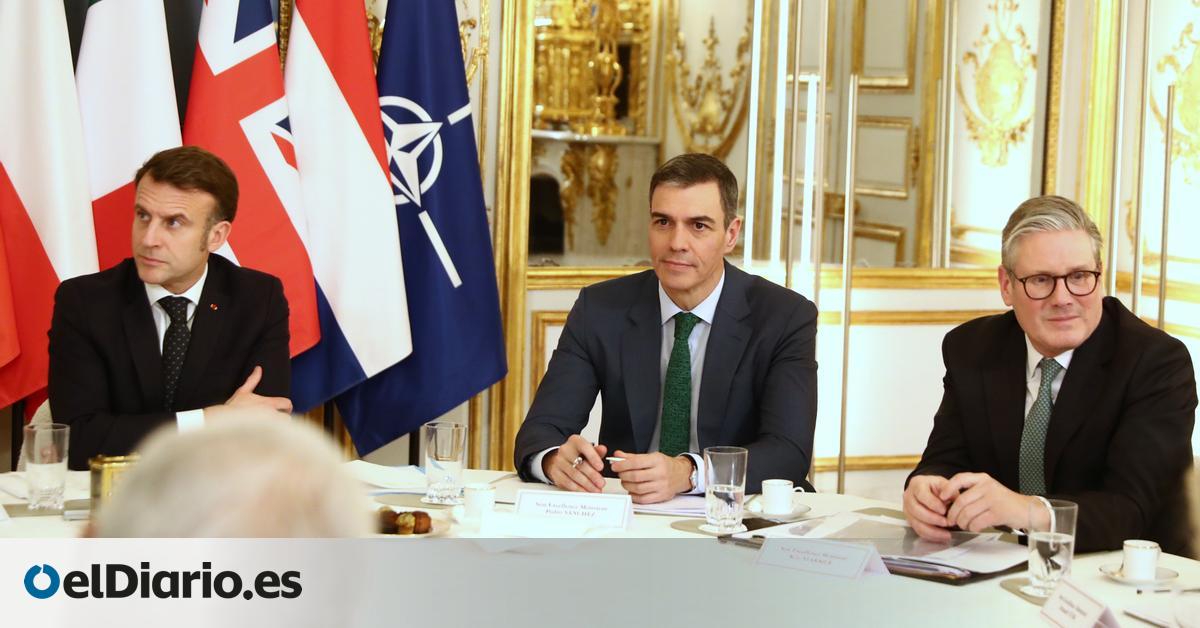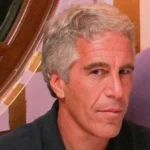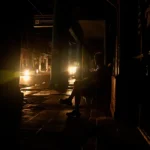
The ‘shock’ for the return of Donald Trump to the White House is touring Europe with a certain delayed effect. If at the beginning the European leaders did therapy to self -convence that this time they were prepared for a new mandate of the populist leader, who took the commercial war, and then breathed with some relief before the signs that issued on Ukraine, everything has been Set off up the last week. Trump has started a bilateral negotiation with Vladimir Putin and has threatened with some “reciprocal tariffs” whose value for now is incalculable. And in the midst of that perfect storm, Europe is still immersed in its internal divisions on how to face the situation.
Divided came the leaders of the main EU countries (the so -called Weimar+) NATO, Mark Rutte, to an informal meeting in Paris to address the new transatlantic relationships. The reason was the possibility of sending peace to Ukraine once the war ends, which is a proposal that the French president, Emmanuel Macron, put on the table months ago and now, in full debate on how to give security guarantees to Ukraine, charges strength.
The ‘No’ came from several capitals, such as Madrid or Warsaw, although Pedro Sánchez has modified his speech. “We don’t see the deployment of Spanish troops in Ukraine,” he said in December. After the appointment in Elíseo, the Spanish president has said that it is not time to talk about that. “We are still at war in Ukraine. There are Ukrainian soldiers who are defending the independence and freedom of their country and the European coexistence model. I understand the question, but these peace conditions have not yet been given so that we begin to think about design, ”he replied.
Along the same lines the German Foreign Minister, Olaf Scholz, who has considered that it is the “erroneous moment” has been spoke: “You are talking behind the backs of the Ukrainians about the results of some conversations that have not occurred, that Ukraine has not spoiled and in which she is not invited to the table. ” For its part, the Polish Government of Donald Tusk has used other arguments to disregard the proposal. “It was not a possibility, because the duty of Poland with NATO is to protect the eastern flank, that is, its own territory,” said Foreign Minister, Radosław Sikorski.
Leaders ask Trump for protection for Ukraine
On the contrary, the British Prime Minister has welcomed the approach: “The United Kingdom is willing to play a leadership role in the acceleration of work on security guarantees for Ukraine. This includes greater support to the Armed Forces of Ukraine, where the United Kingdom has already committed to contributing 3,000 million pounds a year up to at least 2030. But it also means being prepared and willing to contribute to security guarantees for Ukraine our own troops on the ground if necessary. ” “I don’t say it lightly. I feel deeply the responsibility that entails putting British military in danger. But contributing to guarantee the security of Ukraine is to contribute to guarantee the security of our continent and the security of this country, ”he explained in an article published in The Telegraph.
At a time when Starmer is raising new relations with the EU after Brexit, and especially in terms of security, he has reiterated the offer in the press conference after the appointment.
In what Starmer, Sánchez and Tusk have coincided, is to claim the US to get involved in the support of Ukraine after the war. “There must be a support from the United States because the United States security guarantee is the only way to effectively deter Russia to attack Ukraine again,” said the British. “Poland is determined to cooperate in security matters, in Ukraine and in the Russian-Ukrainian war, with the European Union, the European allies, including Britain and Norway and, of course, above all, with the United States,” He had expressed Tusk.
Less explicit has been Sánchez, who has not expressly cited Trump. “In the security guarantees to Ukraine there must be solidarity of all allies,” he said in the appearance in the Spanish embassy in Paris.
Another coincidences is the need to increase military spending to guarantee European “self -defense”, as Tusk said. But that theme is deeply divisive in the EU. The president of the European Commission, Ursula von der Leyen, has proposed to give even more flexibility to fiscal discipline for defense spending, that is, those items do not compute when counting the deficit and debt of the countries, the countries, the countries, that have to be between 3% and 60 & of GDP, respectively, so that there are no reprisals of the community club.
How to finance military spending
That plan, which has yet to be realized -it has already been launched in the case of Poland but the national exhaust clause can be activated to remove the top of debt and deficit -generates some consensus in the EU. But there are countries that see it insufficient, as is the case of the Sánchez government. “As happened with the COVID-19, the fiscal rules were more flexible, but a series of joint mechanisms had to be launched to deal with the emergency,” said the president.
What it refers to is the possibility of issuing joint debt to finance these expenses, which are enormous to reach 2% of GDP in the case of Spain and even greater at a time when the allies argue that this objective has been It is short and point to a greater ambition for the June NATO summit. Also to financing by European entities, such as the European Investment Bank chaired by Nadia Calviño.
But joint debt issuance already has the preventive rejection of countries such as Germany or frugal. “I don’t think more public debt is the way to follow. We need defense and a strong economy, but more debt is not, ”said Dutch Finance Minister Eelco Heinen, who has pointed to the need to make cuts in other items:“ All member states are looking for fiscal space. To spend in defense, you have to make elections in the budget. I know it’s difficult, but you have to do because money is not free. What we spend on one thing cannot spend it on another, ”he said Monday before meeting with his eurozone counterparts.
The geopolitical context advances like this while the EU calibrates how to respond to Trump’s commercial war. While countries like France claim to act immediately and firmly, other capitals are less forceful and bet on the negotiation that, in any case, is underway with the presence of the Commission of Commerce, Maros Sefcovic, this week in Washington. And the great fear in Brussels is that the countries governed by the extreme right, such as Italy and Hungary, make war on their own. And given that possibility,: “Commerce is an exclusive competence of the European Union. Member States cannot negotiate on their own ”,
Source: www.eldiario.es

